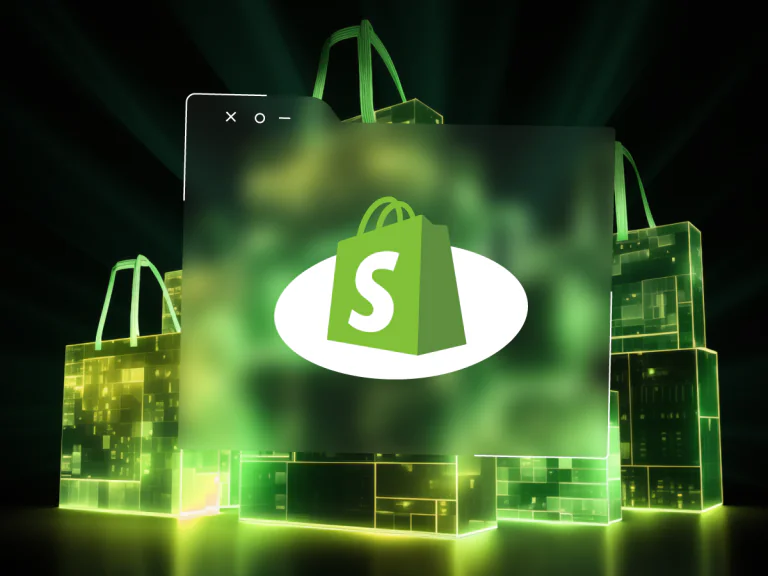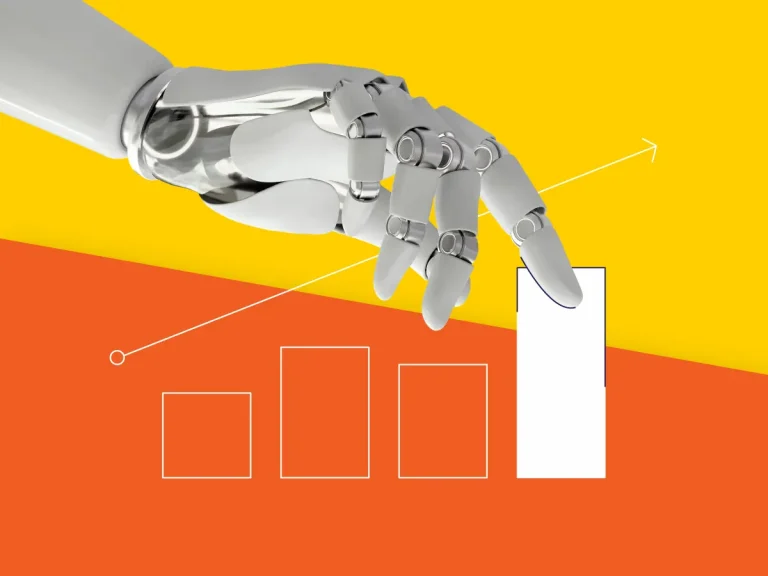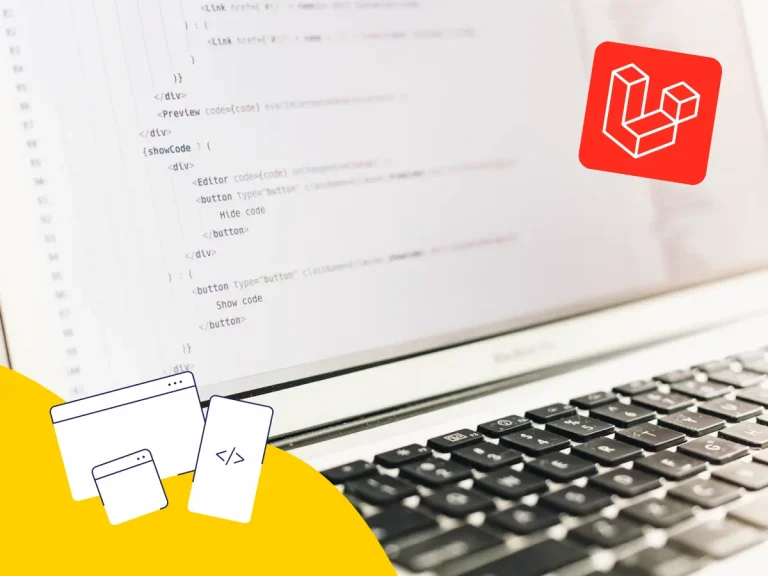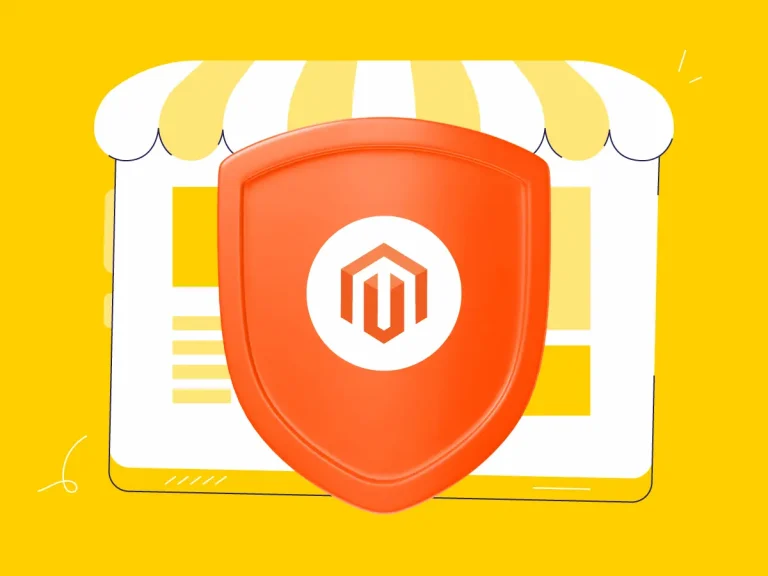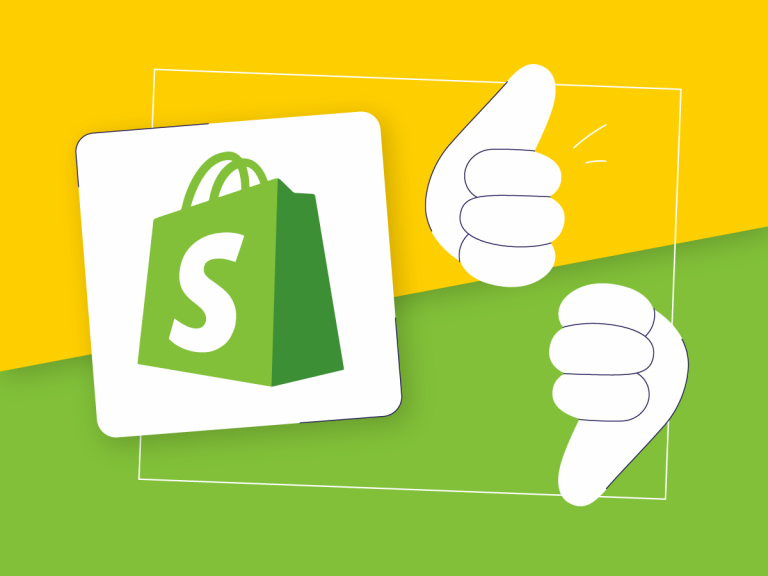READING TIME: 9 mins
Why Choose Laravel Framework For Web Development
September 12, 2023

Alex Burmey
Senior Back-End Developer, Magento 2 and Laravel expertise
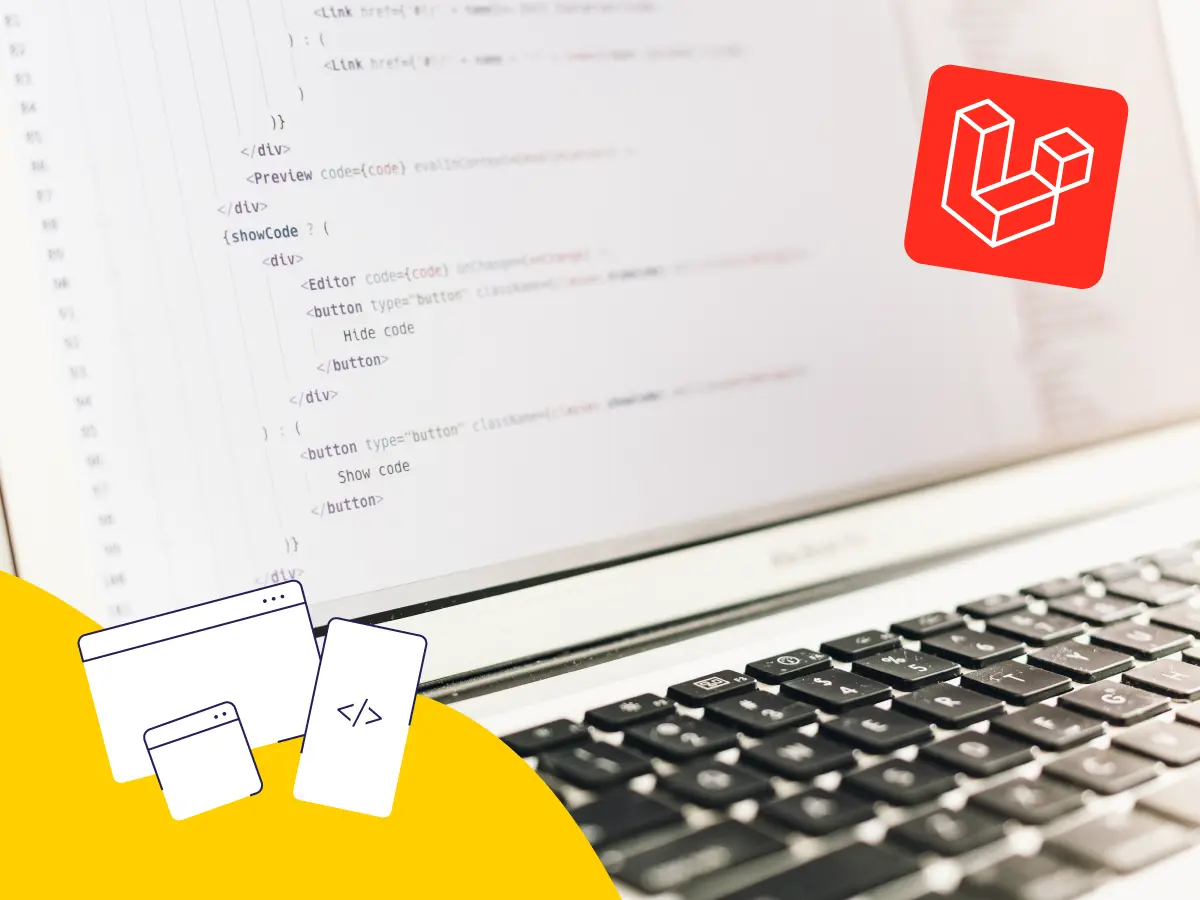
Laravel stands out as a shining star among the variety of available web development options. In this article, we will explore why Laravel should be your top choice for your business. We’ll figure out when this PHP framework is the best-suited option for you.
Not sure where to start web development with Laravel?
What is the Laravel framework?
Launched in 2011 by Taylor Otwell, this open-source PHP web application framework has taken the web development world by storm. Over the years, Laravel has grown into a mature and reliable tool widely used worldwide.
In 2023, over 44,000 companies chose Laravel as their preferred framework. This widespread adoption underscores Laravel’s effectiveness and adaptability in web development.
This framework is reliable for large-scale projects. Pfizer and BBC, among other notable companies, have opted for Laravel to develop their websites and applications.
Furthermore, Laravel’s versatility can cater to a diverse range of industries. Invoice Ninja, Alison, Barchart, TourRadar, and MyRank are among the renowned brands that entrusted their digital presence to Laravel.
On a global scale, 696,000 websites worldwide use Laravel. Within the United States alone, 274,000 websites have embraced Laravel as their preferred framework. This number reflects its strong presence and trust among businesses in the country.
The diagram below compares the market shares of the most popular PHP frameworks. As you can see Laravel stands out with 35.87%. It’s a clear indication that this platform is the leading choice among PHP frameworks.
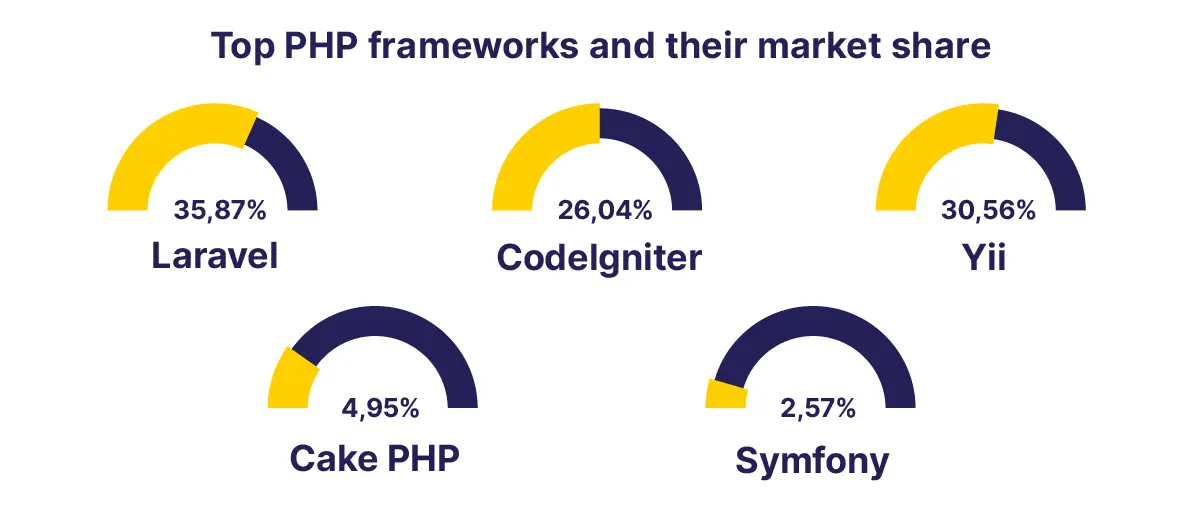
Features of Laravel Framework
Powered with PHP, the Laravel framework comes with rich functionality out of the box. Let’s take a look at its features that may enhance the quality of your web applications.
Eloquent Object-Relational Mapping
Laravel’s Eloquent ORM simplifies database operations. It’s a powerful tool for web applications that need robust database functionality. This reduces the amount of SQL code the developers need to write. In this way, they can ensure your code is clean and more maintainable.
Blade Templating Engine
Blade is an intuitive and lightweight templating engine. It’s designed to simplify the process of creating dynamic, data-driven web pages. So, developers can create elegant and reusable templates.
-
Intuitive Syntax
Blade uses a simple and familiar syntax, which resembles plain PHP code. So, it’s easy for developers to write and understand templates. This makes it accessible to both experienced and less-experienced developers. -
Template inheritance
Blade supports template inheritance. You can define a base layout and extend it with child templates. This promotes code reusability and consistency in your application’s design. -
Component-based UI
Blade supports the creation of reusable UI components. This enhances your website’s design without excessive code. In this way, you can build a complex user interface with many shared elements.
Authentication and Authorization
Laravel provides a built-in system for user authentication and authorization. Its system stands out with its user-friendliness, flexibility, scalability, and security features.
-
Integrated and comprehensive
Laravel provides a well-integrated system for both authentication and authorization. It includes pre-built controllers, views, and middleware for these processes. -
Customizable
Laravel provides default implementations for authentication and authorization, but it’s also highly customizable. Developers can tailor these systems to fit your specific requirements. -
Policies and gates
In Laravel, it’s easy to define and enforce authorization rules. So, you can control what users can do with specific resources or parts of your app. -
Ecosystem and packages
Laravel features a large ecosystem of packages and extensions. Developers can leverage third-party packages to extend authentication and authorization functionality. For example, add role-based permissions.
Artisan Console
The Artisan command-line tool automates various development tasks. So they can more efficiently manage your Laravel applications.
The Artisan console is used for:
-
Code generation
It can generate code for various application components. For instance, you can create a new controller with a single Artisan command. This saves you time and effort. -
Database migrations
Artisan provides commands for creating and running database migrations. This is essential for database schema management, especially in team environments. -
Database seeding
You can seed your database with sample data. For example, populate your database with initial data for testing and development purposes. -
Task scheduling
Artisan includes a task scheduler to plan tasks to run at specified intervals. You can define scheduled commands that perform tasks. For example, sending emails, cleaning up data, or performing regular maintenance.
Integration with mail clients
Laravel simplifies the process of sending emails. You can use it for transactional messages, notifications, marketing campaigns, or customer support.
-
Driver-based email services
Laravel supports many email service drivers out of the box. For example, SMTP, Mailgun, Sendmail, and more. So you can choose the email service that best suits your needs and budget. -
Clean and consistent API
Laravel provides a clean and consistent API for sending emails. The code is organized and easy to understand, making it simple for developers to work with. -
Mail templates and markdown support
Laravel simplifies email content creation with built-in support for mail templates and Markdown. This means you can craft appealing and consistent email messages. -
Multiple recipients and attachments
Laravel’s email system supports sending emails to several recipients and attaching files. So, it’s suitable for various scenarios: order confirmations, invoices, and product recommendations. -
Customizable email events
Laravel’s event-driven architecture allows you to customize email events. For instance, you can trigger emails when a user buys a product, abandons a cart, or receives a message. -
Scaling and Deliverability
Laravel’s email integration can adapt to handle large volumes of emails. So, it’s a perfect option for sites that are growing. Additionally, you can enhance email reliability with services like Mailgun or SendGrid.
What is Laravel used for?
Unlike Magento or Shopify, Laravel is a general-purpose framework that can be adapted to any business requirements. In the eCommerce field, it’s commonly used for:
-
Customer Relationship Management (CRM) Systems
-
Product Information Management (PIM) Systems
-
Order Management Systems (OMS)
-
Warehouse Management Systems (WMS)
-
Configure, Price, Quote (CPQ) Software
Laravel is perfect for developing complex systems and processes. This framework is compatible with React.js, Vue.js. It offers various premade components for managing products, discounts, customers, payments, etc.
Did you know that Laravel has also more than 15,000 pre-built packages for different business tasks? Find out more about the 10 best Laravel packages for e-commerce in 2024.
Considering Laravel development or migration?
Laravel benefits for your business
The advantages of the Laravel framework mainly concern its technical characteristics. It can improve your bounce rates, conversions, website performance, and reliability.
1. Speed and efficiency
A one-second delay in website loading time can lead to a 7% reduction in conversion rates (Akamai). With Laravel, you can avoid such losses. It’s designed with performance in mind.
Laravel employs a variety of optimization techniques, such as caching. This ensures your eCommerce website loads fast and handles a high traffic volume without breaking a sweat. The speed advantage translates into better user experiences, higher conversion rates, and increased revenue.
2. Robust security
In a survey by Cybersecurity Insiders, 48% of organizations reported at least one breach in the past 12 months. Laravel’s security measures can reduce the risk of your eCommerce site falling victim to cyberattacks.
Laravel is renowned for its security features. It offers built-in tools for protection against common web threats. It prevents SQL injection, cross-site scripting (XSS), and cross-site request forgery (CSRF). Additionally, Laravel receives regular security updates, keeping your website shielded from emerging threats.
Laravel security features include:
-
CSRF Protection
Laravel generates unique CSRF tokens for each user session to prevent attacks. -
Input Validation
Laravel ensures the validation of user input and protection against malicious data. -
Authentication Scaffolding
The built-in authentication system includes hashing for the secure storing of passwords. -
Middleware
You can use middleware to filter incoming HTTP requests and run security checks.
3. Scalability
A study by Shopify found that global eCommerce sales are projected to reach $6.3 trillion by 2024. eCommerce websites often start small but can quickly expand. Laravel’s scalability is among the top benefits of using Laravel for growing business.
This platform is an excellent choice for businesses with ambitious growth plans. It features modular architecture. Thanks to this, developers can add or remove features without disrupting the entire system. This flexibility ensures your eCommerce site can grow with your business.
4. Exceptional developer experience
Laravel has gained a reputation for its developer-friendly environment. It features elegant syntax, clear documentation, and a wide range of built-in functionalities. With all that, it simplifies the development process. This means your development team can reduce development time and costs.
5. Rich ecosystem of packages
Like Magento, Laravel boasts a thriving ecosystem of packages and libraries. This means you can integrate various features into your eCommerce site. Your development team will not need to reinvent the wheel. Even though packages need to be configured, the process will not take too much time.
Whether it’s payment gateways, social media authentication, or SEO tools, there’s likely a Laravel package available to streamline the process.
Laravel’s ecosystem continues to grow. Currently, there are over 15000 packages available on the Packalyst website. This wealth of resources can speed up your development timeline.
6. Blade templating engine
Appealing interface design can lead to a 32% increase in customer retention rates. That’s why the front-end experience is crucial for commercial websites.
Laravel’s Blade templating engine simplifies the creation of attractive and responsive interfaces. It simplifies the creation of dynamic web pages and layouts.
Blade is one of the key features that makes Laravel a popular choice for web development. Laravel’s templating engine helps you create fast-loading, appealing pages that keep customers engaged.
7. Database migrations and seeding
Managing databases is a vital aspect of online business. Laravel tools simplify database setup, version control, and data population. This ensures that your database structure evolves as your website grows.
Lavarel pros and cons for web development
Laravel offers many benefits for web development. But it’s essential to consider the potential drawbacks as well. Here’s a balanced look at the pros and cons of using Laravel:
| Pros | Cons |
|---|---|
| Performance Laravel’s speed and efficiency contribute to improved user experiences and higher conversion rates. | Learning curve Laravel may have a learning curve for those new to the framework. |
| Security Built-in security features and regular updates help protect your site and data. | Resource-intensive Extensive features can be resource-intensive, requiring robust hosting for optimal performance. |
| Rich ecosystem A wealth of packages and libraries accelerates development and enhances functionality. | Unnecessary complexity Some built-in features may not be necessary for simpler websites. |
| Blade templating engine Appealing front-end interfaces help keep your customers engaged. | Dependency on community packages Relying on third-party packages can pose risks if not well-maintained. |
Final thoughts
To sum it up, Laravel is a standout choice for business owners looking to establish a strong online presence and drive revenue growth. It’s a perfect option for businesses seeking stability, performance, and optimization.
If you need to build a robust website with complex functionality, like CMS, CRM, PIM, etc., Laravel is definitely for you. So, whether you’re launching a new business venture or considering a migration to a more capable platform, choosing Laravel is a decision that can propel your business forward.
However, it may be unnecessarily complex for small businesses. In such cases, you may consider WooCommerce, Shopify, or Magento for your store.
Around 700k websites are built with Laravel
Featured Articles
Take a look at our latest blog posts to find out more about how our collaboration can empower your eCommerce business


